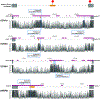Poison exon annotations improve the yield of clinically relevant variants in genomic diagnostic testing
- PMID: 37161864
- PMCID: PMC10524927
- DOI: 10.1016/j.gim.2023.100884
Poison exon annotations improve the yield of clinically relevant variants in genomic diagnostic testing
Abstract
Purpose: Neurodevelopmental disorders (NDDs) often result from rare genetic variation, but genomic testing yield for NDDs remains below 50%, suggesting that clinically relevant variants may be missed by standard analyses. Here, we analyze "poison exons" (PEs), which are evolutionarily conserved alternative exons often absent from standard gene annotations. Variants that alter PE inclusion can lead to loss of function and may be highly penetrant contributors to disease.
Methods: We curated published RNA sequencing data from developing mouse cortex to define 1937 conserved PE regions potentially relevant to NDDs, and we analyzed variants found by genome sequencing in multiple NDD cohorts.
Results: Across 2999 probands, we found 6 novel clinically relevant variants in PE regions. Five of these variants are in genes that are part of the sodium voltage-gated channel alpha subunit family (SCN1A, SCN2A, and SCN8A), which is associated with epilepsies. One variant is in SNRPB, associated with cerebrocostomandibular syndrome. These variants have moderate to high computational impact assessments, are absent from population variant databases, and in genes with gene-phenotype associations consistent with each probands reported features.
Conclusion: With a very minimal increase in variant analysis burden (average of 0.77 variants per proband), annotation of PEs can improve diagnostic yield for NDDs and likely other congenital conditions.
Keywords: Alternative splicing; Neurodevelopmental disorders; Nonsense-mediated decay; Poison exon; Voltage-gated sodium channels.
Copyright © 2023 American College of Medical Genetics and Genomics. Published by Elsevier Inc. All rights reserved.
Conflict of interest statement
Conflict of Interest Eimear E. Kenny received personal fees from Illumina, 23andMe, and Regeneron Pharmaceuticals and serves as a scientific advisory board member for Encompass Bio, Foresite Labs, and Galateo Bio. All other authors declare no conflicts of interest.
Figures


Update of
-
Poison exon annotations improve the yield of clinically relevant variants in genomic diagnostic testing.bioRxiv [Preprint]. 2023 Jan 13:2023.01.12.523654. doi: 10.1101/2023.01.12.523654. bioRxiv. 2023. Update in: Genet Med. 2023 Aug;25(8):100884. doi: 10.1016/j.gim.2023.100884. PMID: 36711854 Free PMC article. Updated. Preprint.
References
-
- DECIPHER (DatabasE of genomiC varIation and Phenotype in Humans using Ensembl Resources) GRCh37, mapping the clinical genome [Internet] Cambridge: Wellcome Trust Sanger Institute; c2017. [cited 2022 Mar 9]. Available from: https://decipher.sanger.ac.uk
-
- Childerhose JE, Rich C, East KM, Kelley WV, Simmons S, Finnila CR, Bowling K, Amaral M, Hiatt SM, Thompson M, Gray DE, Lawlor JMJ, Myers RM, Barsh GS, Lose EJ, Bebin ME, Cooper GM, Brothers KB. The Therapeutic Odyssey: Positioning Genomic Sequencing in the Search for a Child's Best Possible Life. AJOB Empir Bioeth. 2021;12(3):179–189. doi: 10.1080/23294515.2021.1907475 - DOI - PMC - PubMed
-
- Chong JX, Buckingham KJ, Jhangiani SN, Boehm C, Sobreira N, Smith JD, Harrell TM, McMillin MJ, Wiszniewski W, Gambin T, Coban Akdemir ZH, Doheny K, Scott AF, Avramopoulos D, Chakravarti A, Hoover-Fong J, Mathews D, Witmer PD, Ling H, Hetrick K, Watkins L, Patterson KE, Reinier F, Blue E, Muzny D, Kircher M, Bilguvar K, López-Giráldez F, Sutton VR, Tabor HK, Leal SM, Gunel M, Mane S, Gibbs RA, Boerwinkle E, Hamosh A, Shendure J, Lupski JR, Lifton RP, Valle D, Nickerson DA; Centers for Mendelian Genomics, Bamshad MJ. The Genetic Basis of Mendelian Phenotypes: Discoveries, Challenges, and Opportunities. Am J Hum Genet. 2015. Aug 6;97(2):199–215. doi: 10.1016/j.ajhg.2015.06.009. Epub 2015 Jul 9. - DOI - PMC - PubMed
-
- Srivastava S, Love-Nichols JA, Dies KA, Ledbetter DH, Martin CL, Chung WK, Firth HV, Frazier T, Hansen RL, Prock L, Brunner H, Hoang N, Scherer SW, Sahin M, Miller DT; NDD Exome Scoping Review Work Group. Meta-analysis and multidisciplinary consensus statement: exome sequencing is a first-tier clinical diagnostic test for individuals with neurodevelopmental disorders. Genet Med. 2019;21(11 ):2413–2421. doi: 10.1038/s41436-019-0554-6. - DOI - PMC - PubMed
Publication types
MeSH terms
Grants and funding
LinkOut - more resources
Full Text Sources
Medical

